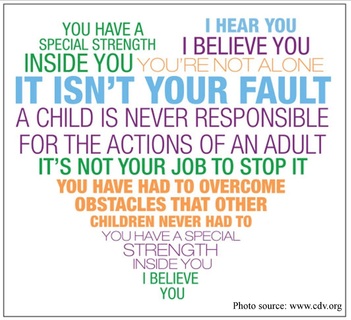|
By Evette Horton, See the Triumph Guest Blogger Many parents who are leaving a violent or abusive home environment struggle with the decision to take their children away from another primary caregiver, i.e., their father, or other caregiving partner. One of the biggest questions I get from parents who have left an abusive situation is, “Should I have taken my children away from their father?” Parents often feel guilt about taking their children away from a partner and unsure if they’ve done the right thing. Though every situation is different, one can generally say that moving children away from a violent and abusive environment is one of best protective factors for a child’s development. In order for children to learn, grow, and be emotionally healthy, they need safety. Their brains literally cannot function or grow to optimal levels when they are living in unsafe environments. The violent and abusive environment raises stress hormones in the child’s developing brain which keeps the brain in a high alert state, instead of a learning state. The longer the children stay in these toxic environments, the more potential damage to their developing brains. Children of all ages are impacted by these toxic environments. A recent study found that infants, even when they were asleep, were absorbing the hostile interactions by their caregivers and had signs of elevated stress. Even if the violence doesn’t happen very often, just overhearing arguments, feeling the tension in the house, or worrying about the next violent event, is enough to make children of all ages feel stressed. When a parent is able to move a child to a place of safety, the stress hormones in the child’s brain can start decreasing and over time, and can return to a normal developmental level, which protects the child’s development. I have seen children flourish in just a few weeks of being in a safe, nurturing environment. Being in a safe place also helps the parent victim begin to feel safe, which helps her have more energy available for parenting. Standard mental health protocol recommends that all children exposed to domestic violence be assessed by a mental health provider with experience working with children exposed to domestic violence. There are providers who can assess and treat children of all ages, including infants. These providers evaluate how the child is socially and emotionally developing, and if they have any concerning symptoms, such as those seen in post-traumatic stress disorder. This is important because children exposed to domestic violence can have a variety of responses. Some responses are easy to see, such as acting out and anger issues; while, some symptoms are tougher to see in children, such as anxiety and depression. We have effective treatments for all of these symptoms and an experienced counselor can be a big help. Removing a child from an environment where domestic violence is present is a big step toward promoting safety, trust, and a healthy developmental environment for a child. Often, it also puts children near other supportive community members and caring adults which are also protective factors for children. Working with a mental health provider gives the parent a better understanding of how the domestic violence may have impacted their child, thereby increasing the parent’s skills and sensitivity around the issue. This is yet another protective factor for children. Though it’s hard to leave an abusive partner, it is important to understand that for children, safety is paramount and moving to a safer environment is one of the best gifts you can give a child. Yes, the child may be upset about leaving a caregiver. This can be a normal reaction to a difficult situation; however, letting your child know you made a choice that would keep you and your child safe, will eventually help them understand the situation, feel safer in the long run, and ultimately recover from living in a stressful environment.  Evette Horton, Ph.D., NCC, LPCS, is a Child and Maternal Therapist at UNC Horizons program, www.unchorizons.org . She works daily with mothers and children exposed to substance abuse and domestic violence. She teaches parenting classes and provides social-emotional assessments and treatment for children ages birth to twelve. If you’d like to suggest any parenting topics that you'd like to suggest that Evette address here on the See the Triumph blog, please leave those suggestions in a comment below. Comments are closed.
|
Archives
July 2024
CategoriesAll About Intimate Partner Violence About Intimate Partner Violence Advocacy Ambassadors Children Churches College Campuses Cultural Issues Domestic Violence Awareness Month Financial Recovery How To Help A Friend Human Rights Human-rights Immigrants International Media Overcoming Past Abuse Overcoming-past-abuse Parenting Prevention Resources For Survivors Safe Relationships Following Abuse Schools Selfcare Self-care Sexual Assault Sexuality Social Justice Social-justice Stigma Supporting Survivors Survivor Quotes Survivor-quotes Survivor Stories Teen Dating Violence Trafficking Transformative-approaches |
Search by typing & pressing enter



 RSS Feed
RSS Feed